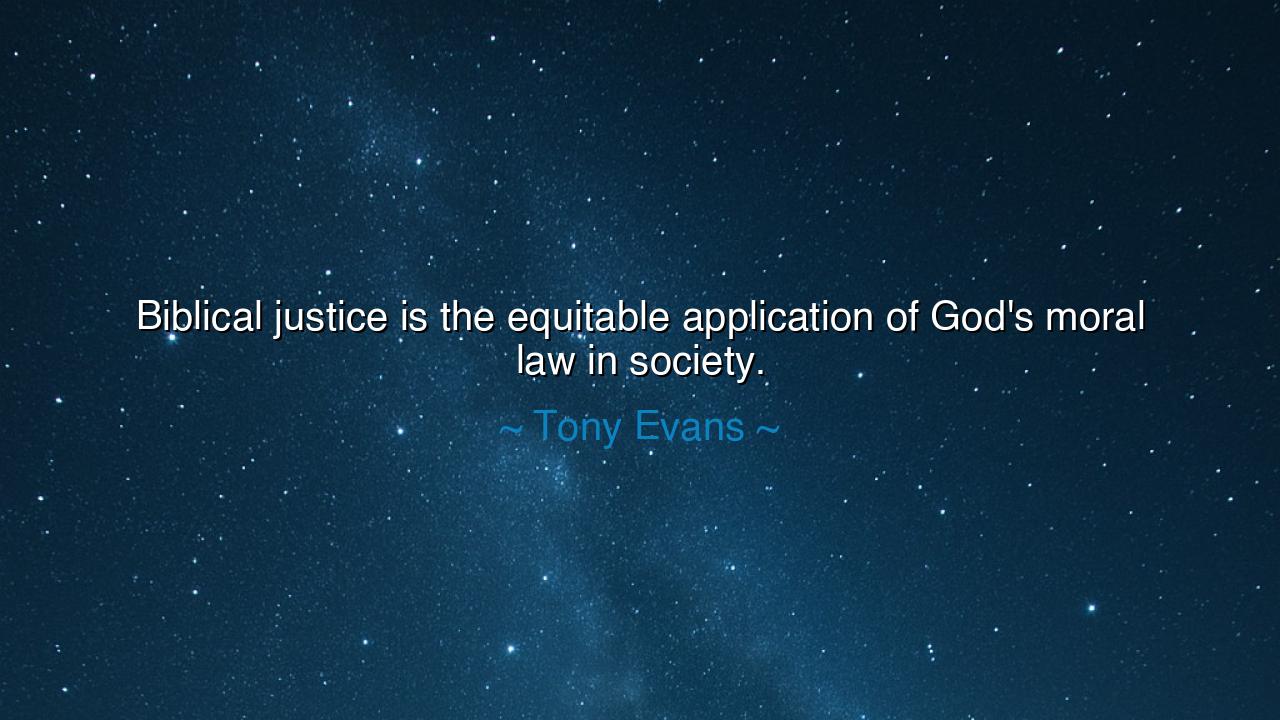
Biblical justice is the equitable application of God's moral law






Hear the words of Tony Evans, who proclaimed with clarity and conviction: “Biblical justice is the equitable application of God's moral law in society.” This is not the justice of shifting opinion, nor the justice of rulers who bend truth to their advantage. It is justice rooted in something higher, something eternal. For Biblical justice demands that the standard of fairness is not the whim of man, but the unchanging moral law of God, applied with equality, compassion, and integrity across the whole of society.
The origin of this teaching lies in the Scriptures themselves, where justice is woven into the very fabric of covenant. In the Law of Moses, in the cries of the prophets, in the words of Christ, we hear the repeated call: do not favor the rich, nor neglect the poor; do not oppress the stranger, nor overlook the orphan. Evans, a modern preacher, drew upon this ancient well, reminding his generation that true justice is not selective but equitable, and that any society which claims to honor God must apply His law not only in temples but in courts, markets, and homes.
The ancients themselves knew this balance between law and divinity. Consider the story of King Solomon, who prayed not for riches nor long life, but for wisdom to govern his people rightly. When two women came before him, each claiming to be the mother of a child, he rendered judgment not by power or partiality, but by discerning the truth through wisdom. His justice reflected something greater than himself, an echo of divine fairness. Thus Evans’s words align with this timeless ideal: justice must reflect God’s heart, not man’s advantage.
History too bears witness to the power of this principle. In the days of William Wilberforce, when the slave trade was defended by wealth and tradition, it was not mere politics that stirred him to fight but the conviction that slavery violated the moral law of God. He saw that a just society could not allow human beings, made in God’s image, to be bought and sold. His decades-long struggle brought freedom to countless lives, and in his triumph we see the outworking of Evans’s words: justice rooted in divine law can overturn centuries of human injustice.
The meaning of this quote is therefore clear: justice divorced from God’s moral law becomes partial and corrupt, serving the interests of the strong over the weak, the powerful over the powerless. But when God’s law is the foundation, equity flows like a river, nourishing every part of society. The widow, the orphan, the foreigner, and the poor are protected, not overlooked; the wealthy and influential are held accountable, not exalted. This vision of justice is not a dream—it is a command, given to shape nations into reflections of divine order.
What lesson, then, shall we who hear this teaching take to heart? That justice must never be measured by convenience, popularity, or tradition. Instead, it must be measured against the eternal plumb line of God’s truth. We must each ask: in my dealings, in my judgments, in the way I treat others, do I reflect equity? Do I seek fairness for all, or only advantage for myself and those like me? A society cannot claim to honor God while trampling His children; nor can an individual walk in righteousness while turning away from injustice.
Therefore, children of the future, inscribe this upon your hearts: to serve God is to seek justice, and to seek justice is to serve God. Let your hands lift the fallen, let your voices speak for the voiceless, let your actions reflect equity in every sphere of life. Do not be content with human standards of fairness, but pursue the divine standard, where mercy and truth embrace, and righteousness and peace kiss one another. For when Biblical justice is lived out, society itself is healed, and the light of God shines through the very fabric of human community.






AAdministratorAdministrator
Welcome, honored guests. Please leave a comment, we will respond soon